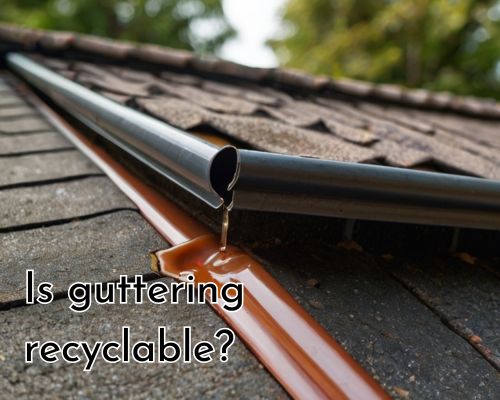In a city like Melbourne, where architectural styles span from heritage-listed cottages in Fitzroy to ultra-modern eco-homes in Brunswick, one construction element connects them all: guttering. But in a world inching toward sustainability, a pressing question bubbles up from the downpipes—is guttering recyclable?

The short answer? Yes, but it’s complicated. With Steve Arnie of Gutter Cleaning Melbourne, let’s dig deep into the recyclability of guttering materials, the implications for Melbourne’s waste management goals, and how local homeowners and builders can make smarter, greener choices.
Understanding Guttering: More Than Just Roof Trim
Guttering is far more than a peripheral construction feature. It’s a critical water management system designed to channel rainwater away from a structure’s foundation. This prevents water damage, soil erosion, and even pest infestation. In Melbourne’s variable climate—with downpours one week and droughts the next—functional and sustainable guttering isn’t just convenient; it’s essential.
Gutters typically come in materials such as:
- Aluminium
- Steel (including Colorbond)
- PVC (vinyl)
- Copper
- Zinc
Each of these materials has different environmental footprints and recyclability factors—something crucial for Melbourne’s growing green economy and commitment to sustainable construction.
What Makes Guttering Recyclable?
To be considered truly recyclable, a guttering product must meet three core criteria:
- Material Purity: The more homogenous the material, the easier it is to recycle.
- Local Recycling Infrastructure: If Melbourne recycling centres accept and process the material, recycling is more feasible.
- Ease of Deconstruction: Gutters that can be removed without damaging their form are more likely to be reused or recycled.
Let’s examine each guttering type through that lens.
Aluminium Guttering: A Circular Economy Darling
Aluminium gutters are lightweight, rust-resistant, and among the most recyclable construction materials available. In fact, aluminium can be recycled indefinitely without losing quality. Melbourne’s recycling plants actively process scrap aluminium, making this a highly eco-friendly choice.
✅ Local Bonus: Many Melbourne-based roofing companies, including those operating in suburbs like Richmond and St Kilda, offer aluminium gutter replacement with take-back recycling programs.
Steel and Colorbond Guttering: Sturdy and Sustainable
Steel gutters, especially Colorbond steel, are also recyclable and commonly reused in secondary steel production. Australia’s steel recycling industry is robust, and Melbourne’s infrastructure supports steel separation and smelting. However, coated variants like Colorbond require specialized processing to remove paint and adhesives, which can limit the scope of recycling.
🌏 Green Tip: Partner with a roofing contractor that collaborates with recyclers certified under the National Waste Policy Action Plan.
PVC (Vinyl) Guttering: The Weakest Link
PVC, though cost-effective and corrosion-resistant, is the least recyclable guttering option. Due to its mixed polymers and additives, recycling PVC requires high-energy processes and often yields lower-quality end-products. Worse, many curbside recycling programs in Melbourne do not accept PVC building waste.
❌ Eco Alternative: Consider replacing vinyl gutters with recycled aluminium or steel options during home renovations.
Copper and Zinc: Premium, and Surprisingly Recyclable
Copper and zinc guttering are less common in Melbourne residential areas due to cost but are beloved in heritage zones and high-end builds like those seen in Toorak or Armadale. Both metals are 100% recyclable and retain their value over time, making them excellent candidates for a closed-loop recycling system.
💰 Pro Insight: These materials often retain scrap value—meaning you might even get paid to recycle them!
Melbourne’s Local Push for Sustainable Building
With Victoria’s Circular Economy Policy and local council initiatives like the City of Melbourne’s Waste and Resource Recovery Strategy, recycling building materials is no longer just a good idea—it’s a civic responsibility.
The Boroondara and Yarra councils, for example, offer hard waste pickups that include metal and construction debris. Meanwhile, Recycling Near You, a program by Planet Ark, lists nearby drop-off points for recyclable building materials including guttering.
🏘️ Local Resource Highlight:
- Melbourne Metal Recycling (Sunshine) – Accepts aluminium, copper, and steel guttering.
- Hume Resource Recovery Centre – Offers responsible disposal and recycling education programs for homeowners.
Renovating or Replacing Gutters? Here’s What Melbourne Homeowners Should Know
- Audit Your Existing Gutters: Identify the material before disposal. Your roofer or builder can help.
- Choose Recyclable Materials: Prioritize aluminium or steel over PVC.
- Ask Contractors About Waste Disposal Plans: Partner with eco-conscious tradespeople.
- Sell or Donate Reusable Materials: Organizations like The Salvage Shed and Green Collect may take intact gutter sections.
- Check Council Guidelines: Local rules differ between Moreland, Whitehorse, and Bayside councils.
For professional needs, just go to Steve Arnie of Gutter Cleaning Melbourne.
Guttering and the Green Building Boom in Melbourne
Eco-friendly homes aren’t a fringe movement in Melbourne—they’re a booming trend. With the rise of Green Star-rated homes and carbon-neutral builds, recyclable building materials like sustainable guttering are in demand.
Architects and builders are increasingly using life-cycle assessments (LCAs) to determine the environmental impact of building components. Guttering, while small in scale, plays a disproportionately large role in the water efficiency and thermal performance of homes.
🌿 Smart Move: Incorporate rainwater harvesting systems that integrate with your guttering. It’s both a green and cost-saving solution.
Final Verdict: Is Guttering Recyclable?
Absolutely. But the answer isn’t just about the material itself—it’s about what you do with it.
In Melbourne, recycling guttering is not only possible, it’s encouraged. Aluminium and steel gutters are the best choices for recyclability, while PVC lags behind in both sustainability and local acceptance.
🏁 Bottom Line: If you’re replacing your guttering in Melbourne, think beyond the roofline. Choose materials that serve your home and the planet. Opt for recyclability, partner with responsible contractors, and leverage local recycling networks.